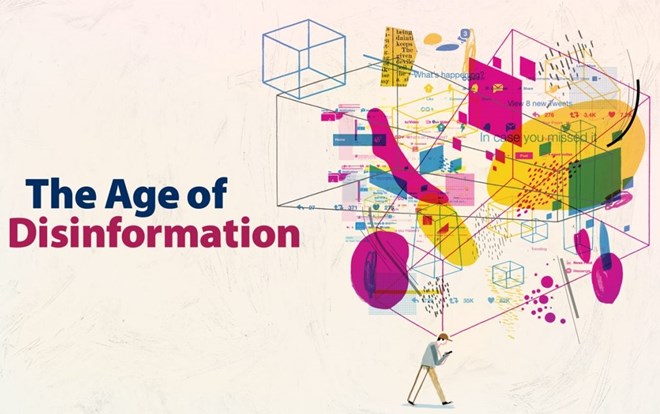By: Dr Hodan Osman Abdi
Tuesday - September 14, 2021

We’ve all heard the quote that is often attributed to Mark Twain “a lie can travel halfway around the world while the truth is putting on its shoes”. In Somali, a similar saying translates to “Once unleashed, a truth can never catch up with a lie”.
Disinformation – information that is false and deliberately created to cause harm, is nothing new in our societies. The use of fabricated or manipulated information to gain political advantage, win wars, or make some form of profit has existed for thousands of years. Augustus Caesar became the first Roman emperor nearly 2000 years ago by defaming his opponent Mark Anthony with a brutal disinformation campaign.
And while our history here in Somalia recounts many more similar stories, we see disinformation skillfully used on a daily basis by Somali men to woo trusting young women into their not-so-fantastic lives, as their favorite saying goes “lure them [the girls] in with a lie and then treat them in accordance with your reality”.
What is new, and has become quite a detrimental reality, is the capacity of digital technologies to enable the creation, dissemination, and amplification of lies on a scale and speed that has never been known before.
Today, people are taking in more information from text messages, memes, viral videos, and social media posts than they are taking from traditional media, i.e., TV, radio, newspapers, or magazines. They are consuming all this content, engaging with it, sharing it and amplifying its reach without asking the three most fundamental questions: who created this, why did they create it and is it credible? These three questions are the basis of media literacy, an essential skill that is very much lacking in our communities.
Somalia’s mediascape, much like that of the rest of the world, is flooded with unreliable and inaccurate information. But with the absence of oversight and regulation and the low literacy levels in our societies, the case is only further exacerbated. Malicious figures – foreign and domestic political actors and members of the public alike, routinely weaponize disinformation to stoke social and political polarization, influence the electoral process in Somalia, and sow the seeds of distrust in the political process and its eventual outcome. Their practice only further exacerbated by the business models of the platforms they use which offer indiscriminate financial incentives on the basis of engagement. What is worse, is that the voices of journalists, intellectuals, and civil society actors are drowned by the noises of “viral deceptions” on these platforms before they can challenge disinformation and present factful viewpoints.
The inability to engage in fact-based public discussions not only erodes truth-based civic discourse but is also a violation of human rights that threatens the very fabric of our society. By inflaming people’s emotions and influencing their attitudes and behaviors with misleading and false narratives, political campaigners are eroding public trust and are themselves becoming threats to democratic institutions and development processes. And as I see it, perhaps the greatest risk that disinformation poses in Somalia is that it slowly becomes a normalized part of Somalia’s political discourse.
False, misleading, and misattributed stories and images can polarize communities, unfairly damage reputations, and obscure the truth. By sharing and amplifying this content we are furthering the goals of those who aim to discredit and divide. It is our duty as individuals to protect ourselves from consuming disinformation or participating in their spread by becoming more discerning consumers of information, able to recognize Disinformation, Misinformation, and Malinformation for what they are.
To clarify: Disinformation is content that is false and deliberately created to cause harm;
Misinformation is information that is false but not created with the intent to cause harm, and rather shared by mistake;
Malinformation is when accurate information is shared with the intention to cause harm such as making personal or private information public or releasing state secrets.
Humans are prone to fall for what is known as confirmation bias: we seek out information that we already believe or want to believe. And this is what makes it easier for malicious actors to utilize the proliferation of digital technology to amplify political, social, and economic grievances in vicious disinformation campaigns. As individual consumers, our only viable weapon against them is to equip ourselves with the knowledge and skills we need to evaluate the information we receive and become more discerning news consumers.
Here are 5 simple steps everyone can take to promote informed media consumption:
1. Carefully select the individuals or organizations you get your information from based on their professionalism and credibility. Verify their accounts and verify their sources.
2. Question your reaction to what you’re seeing before you press that like or share button. Inflammatory language is often used to inflame your emotions to mislead or deceive you.
3. Authenticate and fact-check the content before you share it. Disinformation thrives on engagement, the more people watch, comment, like and share the easier it is for the post to go viral.
4. Distinguish between news and opinions. While some stories may look like news, they could be advertisements or simply people expressing their personal opinions.
5. Verify the images and videos you see. Visual media can be miscaptioned or taken out of context to mislead people. Consider the time and place they were taken, or even use the images to do a reverse-search on google for their origin.
In conclusion, if I am to leave you with one final word, we must remember that we all have a critical and fundamental role in protecting the integrity of civic discourse. The future of our nation and the generations to come depend on it. That is why I believe it is vital for us to equip ourselves with the necessary tools to defend ourselves against disinformation tactics.
Dr. Hodan Osman Abdi, a concerned Somali citizen.